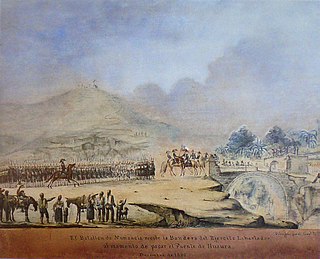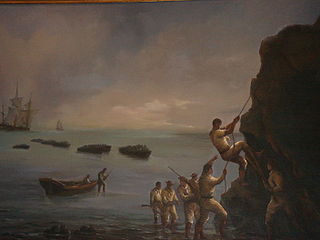 W
WBolívar's campaign to liberate New Granada of 1819-1820 was part of the Colombian and Venezuelan wars of independence and was one of the many military campaigns fought by Simón Bolívar. Bolívar's victory in New Granada secured the eventual independence of northern South America. It provided Bolívar with the economic and human resources to complete his victory over the Spanish in Venezuela and Colombia. Bolívar's attack on New Granada is considered one of the most daring in military history, compared by contemporaries and some historians to Napoleon's crossing of the Alps in 1800 and José San Martín's Crossing of the Andes in 1817.
 W
WThe Bolivian war of independence began in 1809 with the establishment of government juntas in Sucre and La Paz, after the Chuquisaca Revolution and La Paz revolution. These Juntas were defeated shortly after, and the cities fell again under Spanish control. The May Revolution of 1810 ousted the viceroy in Buenos Aires, which established its own junta. Buenos Aires sent three military campaigns to the Charcas, headed by Juan José Castelli, Manuel Belgrano and José Rondeau, but the royalists ultimately prevailed over each one. However, the conflict grew into a guerrilla war, the War of the Republiquetas, preventing the royalists from strengthening their presence. After Simón Bolívar and Antonio José de Sucre defeated the royalists in northern South America, Sucre led a campaign that was to defeat the royalists in Charcas for good when the last royalist general, Pedro Antonio Olañeta, suffered death and defeat at the hands of his own defected forces at the battle of Tumusla. Bolivian independence was proclaimed on August 6 of 1825.
 W
WThe Ecuadorian War of Independence was fought from 1820 to 1822 between several South American armies and Spain over control of the lands of the Royal Audience of Quito, a Spanish colonial administrative jurisdiction from which would eventually emerge the modern Republic of Ecuador. The war ended with the defeat of the Spanish forces at the Battle of Pichincha on May 24, 1822, which brought about the independence of the entire Presidencia de Quito. The Ecuadorian War of Independence is part of the Spanish American wars of independence fought during the first two decades of the 19th century.
 W
WThe Expedición Libertadora del Perú was a force organized in 1820 by Chilean government, with elements belonging to the Liberating Army of the Andes and to recently restored Army of Chile. On 5 February 1819, a treaty was signed between Chile and the United Provinces to finance and organize the expedition to Peru, but in fact, it is Chile who made the effort to do it, since the United Provinces are distracted by internal conflicts and the direct threat of invasion from Spain. The expedition was the continuation of the plan of liberation that General José de San Martín conceived for the Spanish colonies in the Pacific of South America, with the support of General Bernardo O'Higgins in Chile. While the Chilean government headed by Bernardo O'Higgins played a pivotal role in organizing the expedition, the control of the Chilean Squadron was given to the British sailor Thomas Cochrane and the control of the Army was given to the Argentine General José de San Martín. The expedition liberated parts of Peru from Spanish Crown control. The complete liberation of Peru was achieved in 1824 with the intervention of Simón Bolívar.
 W
WThe Long Expedition was an 1819 attempt to take control of Spanish Texas by filibusters. It was led by James Long and successfully established a small independent government, known as the Republic of Texas. The expedition crumbled later in the year, as Spanish troops drove the invaders out. Long returned to Texas in 1820 and attempted to reestablish his control. In October 1821, Long was defeated by Spanish troops, captured and sent to Mexico City where he was killed by a guard.
 W
WThe Pemmican War was a series of armed confrontations during the North American fur trade between the Hudson's Bay Company (HBC) and the North West Company (NWC) in the years following the establishment of the Red River Colony in 1812 by Lord Selkirk. It ended in 1821 when the NWC merged with the HBC.
 W
WThe Portuguese conquest of the Banda Oriental was the armed-conflict that took place between 1816 and 1820 in the Banda Oriental, for control of what today comprises the whole of the Republic of Uruguay, the northern part of the Argentine Mesopotamia and southern Brazil. The four-year armed-conflict resulted in the annexation of the Banda Oriental into the United Kingdom of Portugal, Brazil and the Algarves as the Brazilian province of Cisplatina.
 W
WThe Totonicapán Uprising of 1820 was an uprising of indigenous Maya peoples (K'iche') against the Spanish Empire that occurred in Totonicapán, located in the western highlands of Guatemala. The revolt was in response to the excessive tribute demanded by the colonial authorities and managed to establish a short lived breakaway state in Totonicapán with a free indigenous government. The rebellion was concurrent with the independence of Central America and other Latin American wars of independence.
 W
WThe Capture of Valdivia was a battle in the Chilean War of Independence between Spanish forces commanded by Colonel Manuel Montoya and the Chilean forces under the command of Lord Cochrane, held on 3 and 4 February 1820.